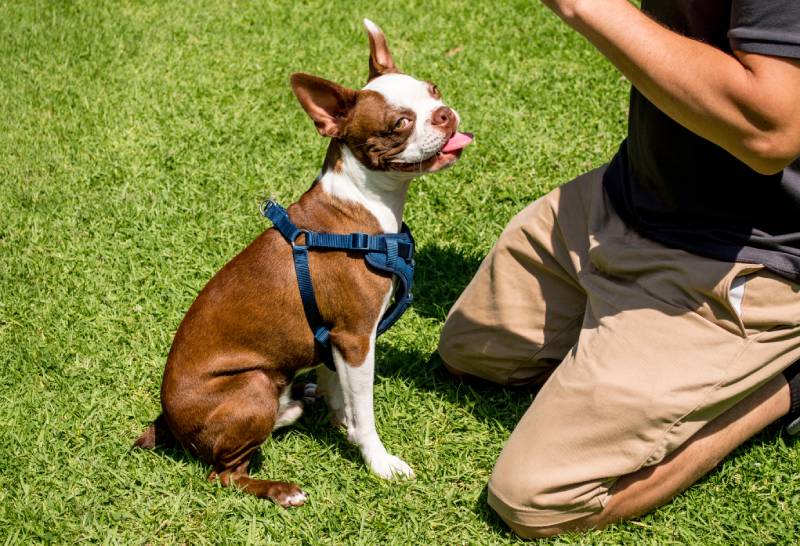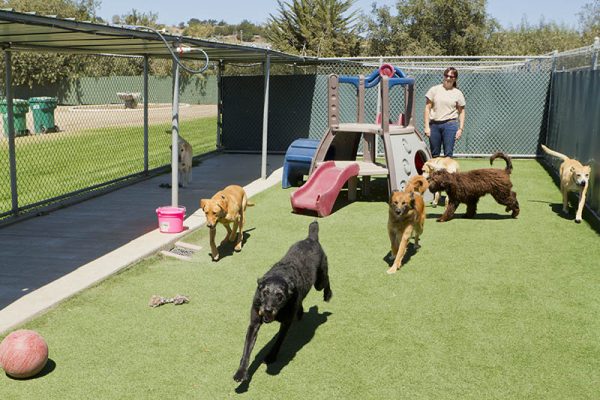The Boston Terrier is an adorable, happy-go-lucky breed that is known for being friendly, loving, and quite amusing to those who have the pleasure of being around them. Terrier breeds are known for barking a lot, so most naturally assume that Boston Terriers are no exception.
Unlike most terriers, which were originally bred for vermin control through digging and hunting small prey, the Boston Terrier has a different history. Developed primarily for companionship and sadly for early dog fighting sports rather than traditional hunting roles, Boston Terriers tend to bark less than many other terrier breeds. However, individual temperament can vary, so some Bostons may still be more vocal than others. Keep reading to learn more about the breed’s barking tendency and what you can do about it.

Reasons Why Your Boston Terrier Is Barking

Boston Terriers are not typically very vocal dogs, but it is very important for any dog owner to understand that barking is a form of communication and is completely normal behavior. It’s a good idea to be aware of what your dog is trying to tell you when they bark since it can help you understand their needs and also help you out if barking were to become problematic.
Body language is another important key aspect in understanding your dog’s behavior, so be mindful and observe this as they are barking. Here’s an overview of the most common reasons your Boston Terrier may bark.
Excitement
If your Boston Terrier barks when you walk in the door, at dinner time, when you grab the leash, or let them know it’s time to go for a car ride, this is a sign of excitement. Sometimes, all it takes is a sound or a familiar word for them to pick up on what’s going on, and if it’s something they enjoy doing, you may be met with high-pitched yips as they get their excitement out.
Barks of excitement are typically accompanied by tail wagging (or nub wagging, in this case), perked ears, and a high head. They may even spin around in circles with a smile or shuffle and tap their paws.
Attention
Dogs bark to get your attention for various reasons. These barks are long periods of single, persistent barks. Your Boston Terrier may be trying to grab your attention for many reasons, such as hunger, to go for a walk, or even if you just want some love and affection.
This type of barking can quickly become problematic if you are to give in to their needs after they bark at you. It is important not to respond immediately and only give in to their demands after they have become quiet. If you give in to this behavior, they will quickly realize that barking gets them what they want.

Boredom
Some dogs bark out of boredom and are trying to communicate that their mental or physical needs have not been met. These barks are typically lower pitched with more neutral body language, but some may get more excitable and bow down in a position that shouts, “Play with me!”
Territorial Behavior
Territorial barking occurs when something out of the ordinary has caught your dog’s attention. You may or may not see or hear the root cause of the barking, as dogs may have sniffed something, they also have much sharper hearing than we do. This type of barking is pretty common and may result from a stranger approaching the door or the sound or sight of another animal nearby.
It may bring forth their more protective, territorial nature, which is displayed with a tense posture, with their heads and ears perked up and alert and the tail straight. They may also emit some low grumbles.

Fear or Anxiety
It’s not uncommon for dogs to bark when they are feeling anxious or fearful. This can also happen when they see something out of the ordinary, and rather than feeling territorial, they are more concerned about a potential threat.
Body language associated with fear or anxiety typically includes tense posture, the tail being tucked between the legs, hackles raised, and a lower head position. It is essential to desensitize and socialize your Boston Terrier from an early age to feel more confident and comfortable when met with situations that fall out of the norm..
Pain
Some dogs bark when they are in pain. This is usually due to more intense pain that can occur if they have been touched in a very sensitive area. It can also happen during painful movements or if they have been hurt during play or in an interaction with another animal.
A bark of pain is typically a high-pitched yelp accompanied by a look of worry, concern, or even defensiveness if they are trying to get the cause of the pain away from them. If you suspect your dog is yelping in pain when they are being petted or even if they are anticipating being touched, you need to reach out to your veterinarian right away to get to the bottom of it.

Reactive Barking
Reactive barking typically takes the dogs by surprise, resulting in a loud, singular bark that may or may not be followed up by more barking. This type of bark is typically higher pitched and may be accompanied by a quick jerk or jump.
Barking Due to Old Age
As dogs age, not only can their eyesight deteriorate, but their overall cognitive function will not be as sharp as it once was. This can result in barks out of confusion, surprise, or even reasons that can’t be determined. If your older dog is having trouble seeing or declining cognitively, it’s a good idea to talk to your veterinarian to see what you can do to make them more comfortable.

Getting Control of Your Boston Terrier’s Barking

Boston terriers may not be known for excessive barking as a breed, but that doesn’t mean some individuals aren’t going to bark much more than others. It’s important to remember that barking is natural for dogs and is one of their primary forms of communication. If excessive barking is becoming problematic within your household, there are some things you can do to help deal with the issue.
Find the Reason They Are Barking
First and foremost, you need to identify the reason your Boston Terrier is barking. You can put measures in place to get control of the behavior if it has become excessive. This can be done by finding an alternative way for them to communicate their needs or desensitizing them to the stimuli causing them to bark.
Teach the “Quiet” Command

Yelling at your dog will not get you anywhere regarding barking, so you need to implement the “quiet” command into your training. Use a calm but firm voice when you teach this command, then use positive reinforcement such as treats and praise to reinforce correct behavior. Keep training sessions positive and exciting, and ensure everyone in the house utilizes the command so your dog can pick up on it more quickly.
Make Sure They Are Getting Enough Exercise
Boston Terriers are a high-energy breed that should get at least 1 hour of exercise every day. One way to get control of barking is by ensuring your dog gets in that much-needed physical activity to leave them feeling more tired and relaxed. You may try doing a 30-minute to 1-hour walk to start your day so that they are naturally calmer throughout the main part of the day. Regular exercise is vital for every dog and benefits their physical and mental health.
Provide Proper Socialization

Proper socialization is key to preventing many behavioral problems in any dog. It should be a high priority when you first bring your Boston Terrier into the family. They should be exposed to a variety of situations and introduced to different people, animals, and places. This can not only help mitigate barking but will also allow your dog to be as well-mannered and well-behaved as possible.
Do Not Respond to the Barking
A common mistake owners make when their dogs are barking to get their attention is responding to them and giving them the attention they are seeking. This only reinforces barking because it has shown them that they can get the desired result.
Make it a point to ignore your dog while they are barking and only respond to them when they are quiet. Positively reinforce quiet behaviors and be consistent in this process.
Control What You Can in Your Environment
If you have recognized certain triggers that lead your dog to bark, you can implement ways to keep control within the home. For example, if your dog barks every time they see a squirrel outside in the yard, try closing the blinds and shutting the curtains to prevent them from seeing them.
If you have a barking problem while you are away, try turning on the television, music, or other sounds that would normally be going on while you are home.
Try Various Toys and Puzzles

Keeping your dog entertained can be very helpful in reducing barking. Find some toys they enjoy and ensure they have a variety to keep them stimulated. Interactive products such as puzzle toys and treat dispensing toys are a great way to keep them fully focused on what’s in front of them. They are great for dogs that suffer from separation anxiety, too.

Conclusion
Boston Terriers are not a breed known for barking excessively, which may be surprising considering that most small, high-energy breeds are prone to barking a lot. While they may not be heavy barkers overall, that doesn’t mean some owners won’t run into problematic barking.
For owners struggling with barking issues, it’s important to identify the reason for the barking and then implement the proper steps to get control of the behavior. Never shy away from reaching out to your veterinarian or a professional dog trainer if you have any concerns.
Featured Image Credit: Ruben PH, Shutterstock





















